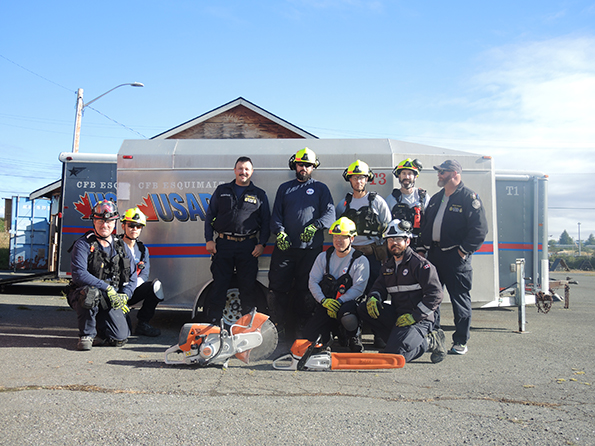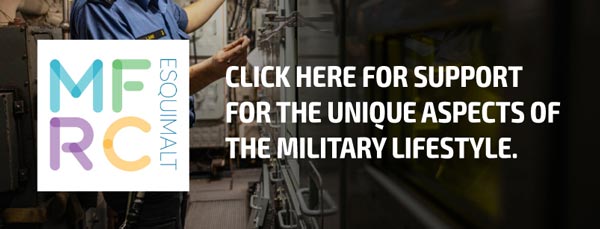
Members of the Vancouver Island MUSAR team erect wood shoring to stabilize a partially-collapsed structure during a training exercise on July 31. Photos supplied.
Kateryna Bandura
Lookout contributor
—
In a nondescript building at CFB Esquimalt, the rhythmic sound of concrete saws and the clang of metal tools echo through the air.
Men and women in yellow helmets carefully maneuver a massive concrete slab using wooden rollers, while nearby, others breach a wall with specialized cutting equipment. Across the room, team members practice intricate patient extraction techniques.
This is not a scene from a disaster movie, but a typical training day for Vancouver Island’s elite Medium Urban Search and Rescue (MUSAR) team.
The MUSAR team stands as a unique blend of military personnel from various trades and ranks. They are the frontline defense against potential disasters on Vancouver Island, ready to spring into action at a moment’s notice when catastrophe strikes.
“We live in a disaster zone, whether people admit it or not,” says Petty Officer 2nd Class (PO2) Connor Nijsse. “B.C. doesn’t train for earthquakes the way it probably should, considering our earthquake potential around here.”
PO2 Nijsse, a 12-year veteran, embodies the team’s spirit of dedication. Balancing roles on three different search and rescue teams, including MUSAR, Juan de Fuca Search and Rescue, and the B.C. Alberta Cave Rescue team, PO2 Nijsse jokes, ‘I just don’t sleep’. His extensive experience in rope rescue and disaster response makes him an invaluable asset to the team.
The team’s mission extends far beyond addressing structural collapses and earthquakes. They are a versatile unit, capable of responding to landslides, conducting large-scale surveys, and tackling various disaster scenarios.

“Our main priority is to get the base functioning,” PO2 Nijsse says, underscoring their critical role in maintaining operational continuity.
What sets this team apart is their unique position: they’re the only Urban Search and Rescue team on Vancouver Island.
The team’s capabilities are as diverse as its members. They train in a wide array of skills, from operating sophisticated search equipment to performing complex rescue operations in unstable structures.
“We have a system called DelSAR, which uses probes that are hypersensitive to sound,” says Lieutenant(N) Kyle Knight. “When a building is damaged, we can use these probes to call out for sounds of survivors in the pile. We can then move the probes around, triangulating their position to dial in where they are.”
Once a survivor is located, the real work begins. The team is equipped with an arsenal of specialized tools: concrete saws, rotary hammers, hydraulic spreaders, and more.
“If you want to go through a wall, we have chainsaws for wood or concrete. If you need to get through the wall and not cut it out to not hurt someone on the other side, we can do a clean break using chipping hammers,” says PO2 Nijsse.
Safety is paramount in these high-risk scenarios. Team members don steel-toed boots, long pants, long sleeves, hearing protection, and dust masks.
The team’s training regimen is rigorous and constant. They meet at least once a month for full-day sessions, with some members participating in additional week-long courses to gain international certifications in structural collapse rescue.
“Most of our training days are just a single day,” says PO2 Robyn Jutras. “We show up and practice one particular skill. We might do shoring one day, go over some basics in the morning, and then a more complicated training that we haven’t done before in the afternoon.”
This continuous training has paid off in real-world scenarios. Lt(N) Knight recounts the team’s response to a natural gas explosion at CFB Comox in 2022:
“The bottom few floors were actually all destroyed. There was no actual egress on the lower levels. What we ended up doing was going through room by room. We stayed there long enough to reinforce the old building. Although we didn’t find anyone alive, we were then able to recover all the members’ personal belongings out of their rooms. If our team did not recover their items, they would have been lost as no one else would have been able to return to the unstable building.”
One of the unique aspects of the MUSAR teams is their egalitarian culture. Ranks and trades are left at the door, fostering an environment where every team member is equal and valued for their contributions.
“It’s nice to have that kind of distinction,” says PO2 Nijsse. “If this team was 100 per cent military, there’s a good chance it would be based on rank. Here, it doesn’t really matter. Some people don’t even know most people’s ranks.”
The team members find their work deeply fulfilling, despite – or perhaps because of – its challenging nature.
As they continue to train and prepare, the MUSAR team hopes their skills won’t be needed in a real disaster. But should the worst happen, they stand ready to respond, providing a critical lifeline for CFB Esquimalt and the surrounding community.









